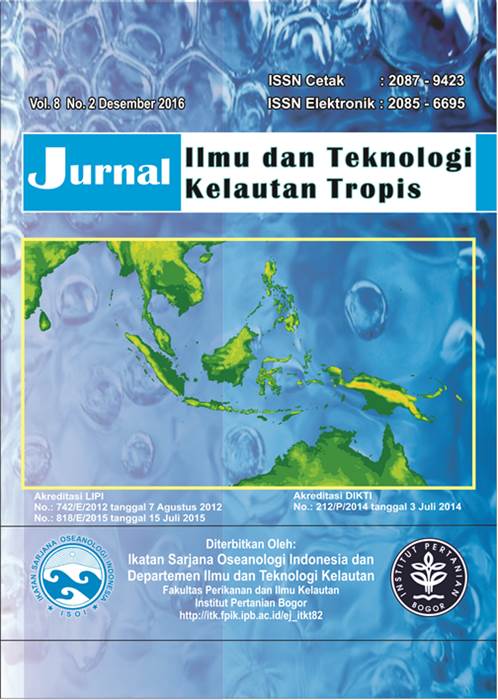THE EFFECTS OF FASTING DURATION AND DIFFERENT DENSITIES OF GROUPER SEED TRANSPORTED IN CLOSED SYSTEM
Abstract
Indonesia is an archipelagic country with many locations suit for aquaculture. Grouper hatcheries are still concentrated in a few locations. Therefore, appropriate technology to transport live grouper seed is needed to ensure the survival and health of the seed. This study aimed to determine the duration of fasting before transportation and the optimum density of grouper seed during transportation. Transportation was conducted in closed system, transported using a car, for 24 hours. Grouper seed used for the experiment was cantik hybrid grouper, a cross-breed between female tiger grouper (Epinephelus fuscoguttatus) and male marbled grouper (Epinephelus microdon) with an average of size 7.0±0.32 cm. There were 2 experiments in this study. Experiment 1 was different durations of fasting before transprotation: A. 12 hours, B. 24 hours, C. 36 hours and D. 48 hours with the density of 150 seeds/boxes. The result of the first experiment was used to determine the experimental design of experiment 2, which consisted of 4 different densities per boxes: A. 125 seeds, B. 150 seeds, C. 175 seeds and D. 200 seeds. Both of the experiments were conducted in triplicates. The seeds were packed in plastic bags with a thickness 0.08 mm, length 120 cm x width 53 cm, filled with 10 liters of sea water. The results showed that the duration of fasting from 36 to 48 hours had the highest survival rate. Polinomial relation y = -0.0439x2 + 3.7696x + 17.075 with the value of R² = 0.966 illustrated that the optimum duration of fasting was 44 hours. There was a significant difference in densities of seeds during transportation (P<0.05), where the higher density lead to the lower survival rate. The density of 125 seeds/boxes resulted in the highest survival rate, 99.0 ± 1.0%.
Authors
This work is licensed under a Creative Commons Attribution 4.0 International License.
Jurnal Ilmu dan Teknologi Kelautan Tropis i is an open-access journal, meaning that all content is freely available without charge to the user or their institution. Users are allowed to read, download, copy, distribute, print, search, or link to the full texts of the articles in this journal without needing to request prior permission from the publisher or the author.
All articles published by Jurnal Ilmu dan Teknologi Kelautan Tropis are licensed under the Creative Commons Attribution 4.0 International License. This allows for unrestricted use, distribution, and reproduction in any medium, provided proper credit is given to the original authors.
Authors submitting manuscripts should understand and agree that the copyright of published manuscripts is retained by the authors. Copyright encompasses the exclusive rights of authors to reproduce, distribute, and sell any part of the journal articles in all forms and media. Reproduction of any part of this journal, its storage in databases, and its transmission by any form or media is allowed without written permission from Jurnal Ilmu dan Teknologi Kelautan Tropis.


